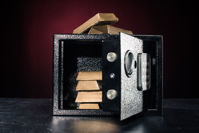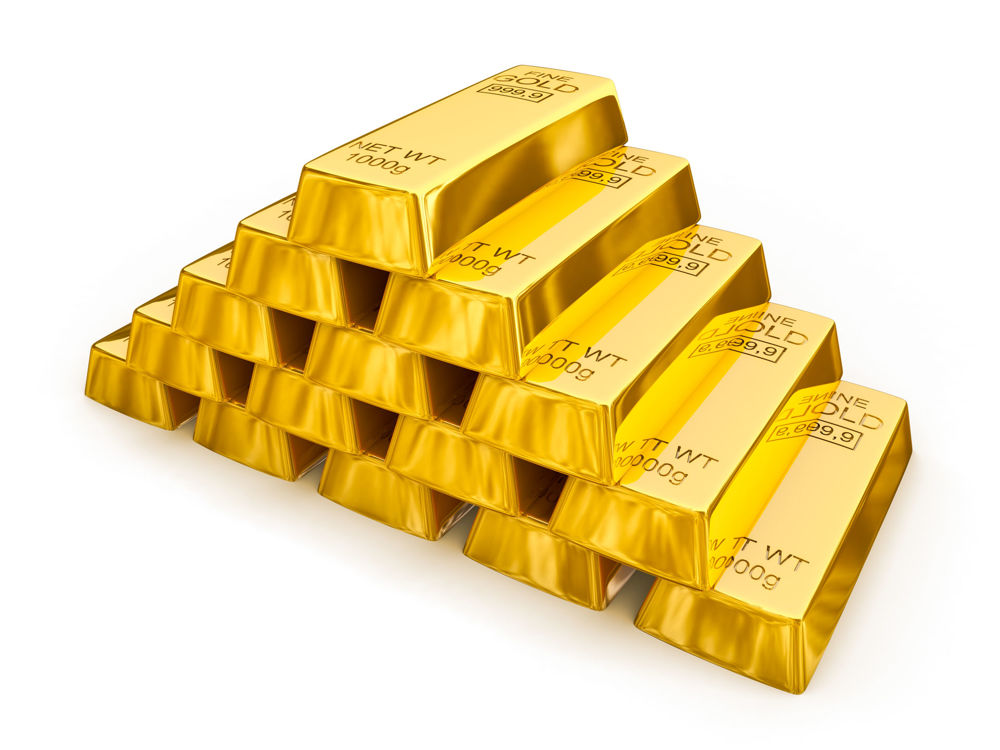Posted on April 07, 2021

Bullion refers to precious metals in their physical form that have been refined to a high purity level. The word bullion comes from the French term bouillon, which referred to the boiling process used to refine precious metals at the time. Bullion is valued based on its weight, which is generally measured in ounces, and its purity. Sometimes, bullion from a specific refiner may command a premium based on popularity and demand. For the most part, though, bullion is valued solely based on its precious metal content.
Bullion can come in many forms, including:
The most common types of precious metals that make up bullion are:
Gold - The most well-known precious metal, gold has been used as money, as decoration, and as a store of value for centuries.
Silver - Widely used in photography, medicine, electronics, and jewelry in addition to its demand among precious metals investors.
Platinum - One of the rarest elements in the Earth’s crust, making it almost as valuable on a per-ounce basis as gold. Much denser and much harder to melt than gold. In addition to its use in jewelry, platinum is widely used as a catalyst in industrial applications.
Palladium - An incredibly rare precious metal (15 times rarer than platinum and 30 times rarer than gold) used in cars to reduce toxic gas emissions and, unlike the precious metals above, rarely used for jewelry.
Typical portfolio investments like stocks, ETFs, and bonds come with their own inherent risks. Consider, for example, “counterparty risk” or the possibility that a company might go out of business, leaving your stock or bond worthless. Governments that issue bonds might decide they’re better off just not paying their debts (or inflating their currencies to eliminate the actual value of the debt).
Many bullion buyers have little trust in the stock market and vastly prefer to spend their hard-earned savings on an asset they can see and hold in their hands.
Alternatively, bullion presents a hedge against the risks of other investments. In fact, investing in gold, silver, and other precious metal bullion has been relied on as an excellent hedge against economic crisis, currency inflation, and stock market crashes for centuries.
For example, the price of gold has performed exceptionally well in times when the Dow Jones Industrial Average has declined. This is especially apparent when looking at recent recessionary periods like that of the coronavirus pandemic. During the beginning and middle of 2020, when the coronavirus shut down the U.S. economy, the Dow Jones performed poorly, while gold bullion increasingly grew in value.
As a store-of-value asset, precious metal bullion tends to maintain its value in difficult economic conditions, making it an excellent option for any well-diversified savings portfolio.
Bullion is a commodity, meaning it’s “fungible.” One ounce of gold is treated the same, from a price perspective, as any other (the same way a $1 bill is interchangeable with four quarters or a hundred pennies). Bullion’s value is almost exclusively derived from its precious metals content.
Meanwhile, numismatic coins made of precious metals derive their value not exclusively from their metal content. Scarcity, condition, beauty, age, and (of course) demand all affect the price. For example, proof coins are considered numismatic as they are produced for the sole purpose of collecting and showcasing.
Here’s another example to help you understand the difference: if you sell a one-ounce gold bullion bar to a dealer, they’ll weigh it and make you an offer. If you bring an 1851 $20 liberty gold double eagle coin to a dealer, they’ll look at it through a jeweler’s loupe, consult pricing guides, do some online research, then make you an offer. For these reasons, numismatic metals are purchased mainly by hobbyists and collectors for additional reasons, including their precious metal content. Central banks and investors generally purchase bullion.
There are several ways to buy physical bullion, each with its own benefits and drawbacks.
|
Purchase Method |
|
|
|
|
Generally, very reputable sources for bullion purchases |
Most require in-person purchasing |
|
Bullion Dealers |
Generally, very reputable sources for bullion purchases |
Dealers charge a premium for your precious metals purchase |
|
Local Dealers |
If you strike a relationship with your local dealer, you might be able to get a good deal |
Will likely have a limited selection of bullion to choose from |
|
|
Possibility of finding an underpriced item |
Higher likelihood of fraudulent activity or purchasing inauthentic precious metals |
|
Online (Amazon, eBay, etc.) |
You can shop from bullion collections around the world |
Higher likelihood of fraudulent activity or purchasing inauthentic precious metals. Limited chance of recovering money lost to a bad purchase. |
If buying and storing physical bullion seems intimidating or complicated, you can instead purchase exposure to bullion through one of these options:
|
Purchase Method |
Pros |
Cons |
|
ETFs |
As easy as buying a stock |
There isn’t always bullion to back the investment, and it can basically never be redeemed for physical bullion. Subject to counterparty risk. |
|
Gold Mining Stocks |
You own stocks of a company that mine precious metals |
You don’t own any physical metals, just company stock. Subject to risks of mining companies going out of business. |
|
|
|
Banks may improperly allocate gold to multiple parties. Also, certificates may be “unallocated”- with no guarantee of an equal exchange for precious metals. |
|
Precious Metals IRA |
Choose a custodian and depository to hold your bullion until you liquidate or take an in-kind distribution. |
You don’t get to physically hold your precious metals. Bullion is locked up in your retirement account, and you would need to take a penalty to retrieve it early. |
Because gold and silver bullion are valuable assets, it’s essential to store them properly to preserve their longevity. Bullion represents a great deal of monetary value in a compact, easily transported package. This makes it a primary target for thieves. When it comes to secure storage for your precious metals, you can choose to store bullion at home or via a third party.
If you are comfortable securing bullion yourself, storing it at home can be a good option. This is the only way to ensure you have access to your bullion at all times and can immediately sell or trade your assets if needed. There are a few things to consider for at-home bullion storage:
If you don’t feel comfortable storing bullion yourself, you can take advantage of a depository storage option. Depositories can range from dedicated, high-security gold depositories to your local bank’s safe deposit box. Regardless of the type of depository, your bullion is stored in a safe location under the watchful eye of added security measures. Consider these questions when choosing a depository:
Accessibility - What is the company’s policy on accessing your bullion? How much notice must you give to access and withdraw your bullion? Access to your bullion is key to ensuring you can recover it at any time.
Ownership - Do you own specific bullion or simply a share of the total reserves? Since you want to invest directly into physical bullion, having continued ownership of your specific bullion is important.
Security - What is being done to keep the bullion protected and safe? If your bullion can’t be kept secure in a depository, then there is no advantage to using this storage method versus at-home storage.
Precious metals insurance is a great way to keep your investment safe and have peace of mind that you are protected. This is especially true if you are storing gold or silver bullion yourself and are concerned about any event that could compromise your assets.
When it comes to at-home storage, homeowners insurance generally won’t cover the total value of your gold and silver in the event of a loss. In general, homeowners insurance policies cover up to $200 per piece for gold and silver, a paltry amount for bullion investors. You may be able to increase this limit by paying more for insurance, but you first must check with your insurance provider. Alternatively, you can purchase a floater policy to cover bullion losses at a higher limit, but you will first have to get your precious metals professionally appraised.
Some third-party bullion storage options like banks and private vaults provide precious metals insurance on any holdings. But don’t assume that insurance is included. Ensure you fully understand what is covered by the vault’s insurance policy and whether bullion is covered under general liability insurance or a separate policy.
When buying bullion, it’s best to ensure you are purchasing from a verified dealer. The bullion market can be full of fraudulent metals that aren’t what they seem. That makes it all the more important to verify you are purchasing precious metal bullion from a legitimate dealer.
Here are a few things to look out for in a bullion dealer:
Investing in precious metals is something you may want to consider for your portfolio. Whether it is coins, bars, or ingots, bullion is an excellent store-of-value asset for recessionary economic periods. Keep in mind the ins and outs of bullion, including how to properly store precious metals, insurance, and verifying your bullion dealer. This way, you can keep your bullion investment secure for years to come.